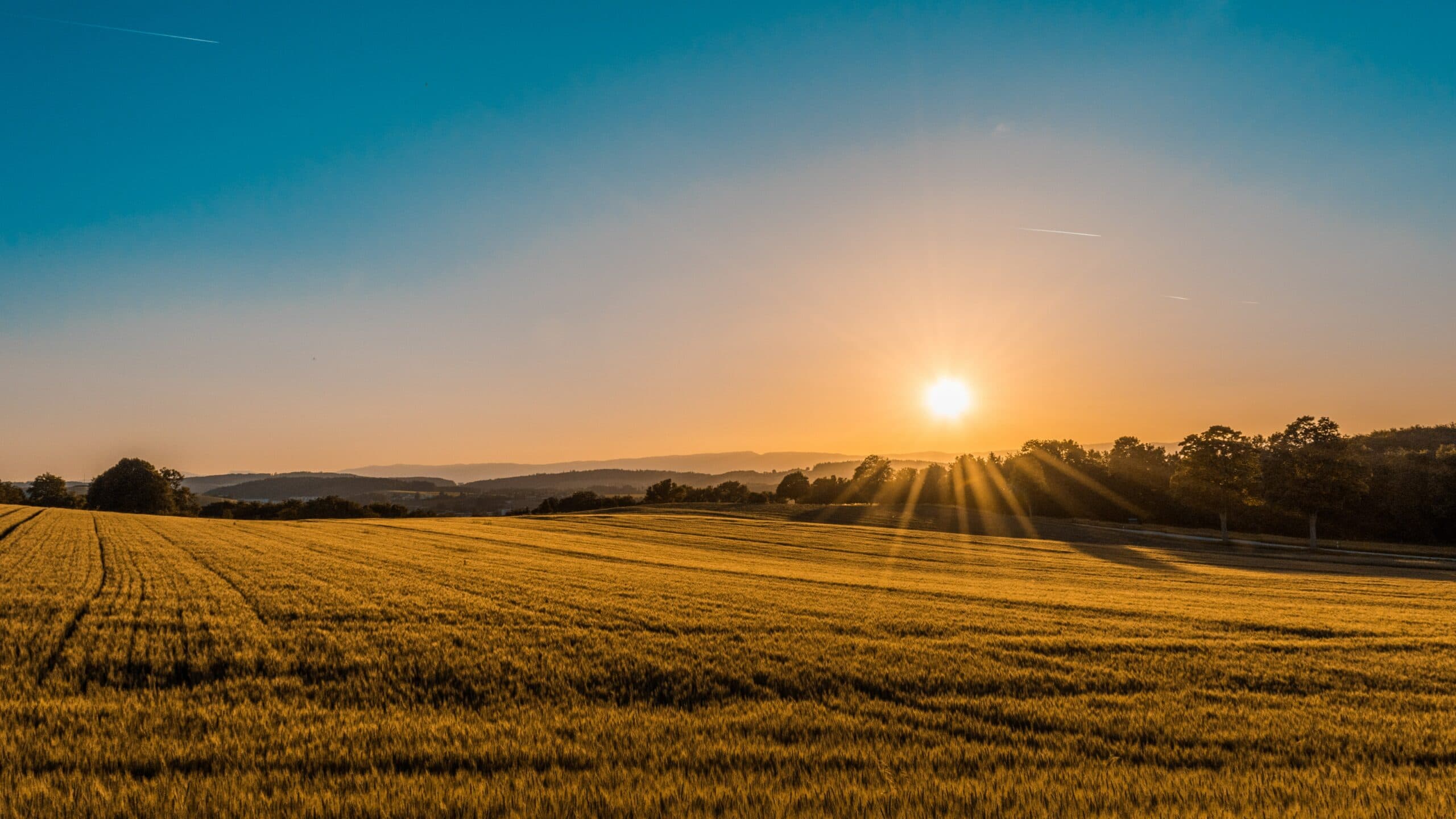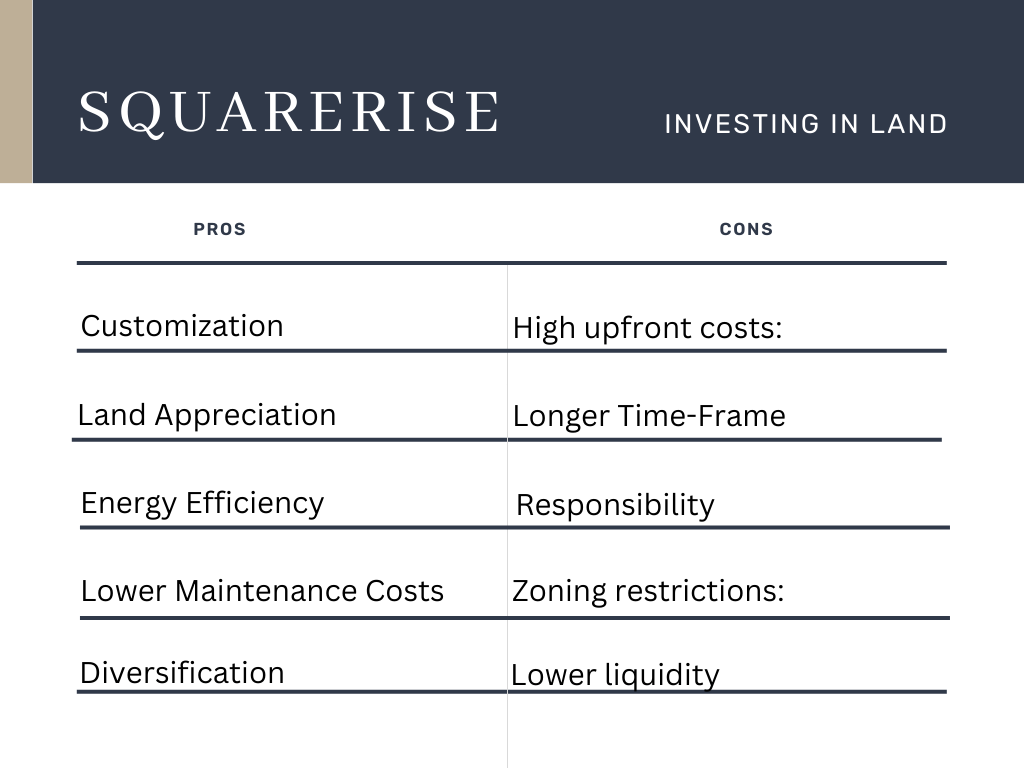
September 24, 2022
Investing in Land Pros and Cons
Buying land and building a home can be a rewarding and fun experience, providing you with a unique and custom living space. However, it’s not without its challenges and limitations. In this article, we will explore the pros and cons of buying land and building a home, so you can make an informed decision. Investing in land has its pros and cons as well. Some of the pros of investing in land include the potential for the land to appreciate in value over time, giving you an asset that could grow your net worth. Land can also give you more control over what gets built on it in the future. Some of the cons are that land doesn’t produce income while you own it, so it could be less profitable than other investments in the short term. There are also costs like property taxes and maintenance that need to be factored in. Carefully weighing the pros and cons of investing in land is important to decide if it aligns with your investment goals and risk tolerance.
Land is a tangible asset that you can see and touch and perhaps (depending on its size, type, and location) use for recreation, storage, or some other purpose while you wait for a run up in its price. It’s also fairly permanent. Land may be damaged or lost through natural disaster or government action, but those are rare events.
On the other hand, land is a very illiquid asset. It’s hard to value, and it can be difficult and expensive to buy or sell. And while the price of land may go up over time, it doesn’t always do so. In fact, in some markets, the price of land may go up over time, it doesn’t always do so. In fact, in some markets, the price of land has been falling for years.
So, what are the pros and cons of investing in land? Let’s take a closer look.

Pros
- Customization: Building your own home gives you the opportunity to create a space that is tailored to your specific needs and preferences. You can choose the layout, finishes, and features that you want, ensuring that your home meets your specific requirements.
- Land Appreciation: Owning land is often considered a wise investment, as it typically increases in value over time. This can provide you with a solid return on your investment and a valuable asset for your future.
- Energy Efficiency: When you build your own home, you have the opportunity to include energy-efficient features and technologies, such as solar panels, insulation, and efficient heating and cooling systems. This can help you save money on your energy bills and reduce your carbon footprint.
Cons
- Cost: Building a home can be more expensive than purchasing a pre-existing one. In addition to the cost of the land, there are also building costs, design costs, and permit fees to consider.
- Time: Building a home can take several months, or even a year or more, depending on the size and complexity of the project. This means you will need to plan ahead and be prepared to wait for your dream home to be completed.
- Responsibility: When you build your own home, you are responsible for all aspects of the construction process, including design, building permits, and construction. This can be overwhelming and stressful, especially for those who are new to the process.
One of the biggest advantages of investing in land is that it’s a finite resource. There’s only so much land on the planet, and as the world population grows, the demand for land will increase. This should lead to increases in the price of land over time.
Another advantage of investing in land is that it can be a hedge against inflation. As the cost of living goes up, the value of land generally goes up as well. This makes sense, since it takes more money to buy the same amount of land as time goes on.
One disadvantage of investing in land is that it can be a risky investment. The price of land can go down as well as up, and there’s no guaranteed return on your investment. You could end up losing money if you invest in land and the price plummet.
Land & Alternatives
The ability to develop and use outlying parcels for what officials consider less than optimal uses is being restricted by zoning boards and other agencies, not made easier, due the increasing value of the land. In other words, sprawl is a negative term.A year ago, close-in city living was more appealing than it is now because of the COVID crisis. However, worsening commute times and job opportunities in cities could make outlying areas less valuable just as quickly as COVID made them more so.
Vacant property is generally difficult to finance; it’s far more challenging than a house or commercial building or working farm already built on it. Lenders are well aware of the expenses and dangers involved in vacant land, and they don’t want to risk taking possession of it as collateral for a loan. When they do take that chance, they make certain to charge a rate of interest that reimburses them for their investment.
Land doesn’t only have unstable prices, it also has many carrying costs that eat into any return on investment. These include taxes and insurance premiums, which both go up as the property becomes more valuable.
Land is a bad investment if you’re looking to convert it to cash quickly, as there is no active market for land like there is for stocks, bonds, and shares. Land is also not easily divisible – you can’t sell just a portion of most properties – so building your land holdings through small investments is difficult.
It might be tough to sell and purchase land. Real estate agent commissions, surveys, title insurance premiums, transaction taxes, and other expenses all take away from your earnings.
Raw land is mostly speculative; you won’t receive any cash dividends from it. Moreover, it has little utility until developed, and comes with annual costs for liability insurance and property taxes. Usually, land that’s sold at a large profit was held for an extensive amount of time or was situated in an area that had sudden growth.
The fact that this last characteristic is increasingly difficult to achieve is due, in part, to the fact that the real estate market in most regions is “efficient.” There are a lot of bargain hunters looking for homes of all kinds in every region; properties for sale are simple to advertise and find; and properties for sale are simple to research, making it difficult to locate one for less than its genuine value. And properties that seem on the surface appear to be inexpensive may have a hidden price tag. A property that hasn’t sold in quite a while, despite being marketed well, is most likely not an excellent deal and may not even be priced “fairly.” There’s probably something the market knows about this particular property that some potential buyers are unaware of yet. All properties aren’t build-able due to local regulations–some have environmental impairments or murky titles. Furthermore, others might experience flooding issues, suffer from arguments over access easements, or face hidden contamination concerns, etc.
This isn’t to say that vacant property is never a fantastic purchase, or that the only assets you should invest in are paper investments such as equities, bonds, mutual funds, and CDs. Just be aware of all costs and dangers before going into any potential land acquisition.